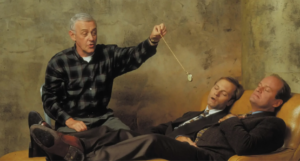Would you want to eavesdrop on an anonymous couple’s therapy session? Hear a woman talk to her husband about the revelation that he secretly fathered twins with a lesbian couple she had doubts about, just after he’d cheated on her with someone else? Millions of people do: this is exactly what the celebrity therapist Esther Perel lets you listen in on, with the latest episode of her wildly successful podcast, Where Should We Begin?
There is something dystopian about people competing for the attention of a famous podcast host to solve their most intimate problems. Hundreds of couples apply for a handful of opportunities to share their stories with Perel, along with her legion of listeners. Her 2006 bestselling guide to marital relations, Mating in Captivity, established her as TED-talking international authority on relationships. By the time Where Should We Begin? launched in 2017, Perel was listed in Oprah Winfrey’s SuperSoul 100 list of “spiritual luminaries”. Her podcast has been downloaded 50 million times since its launch.
It’s not hard to see why. As radical new ways of ordering relationships have proliferated, we no longer hold a set of principles for living in common. Liberalism’s marketplace of ideas has given rise to a marketplace of moralities: as free unbounded agents, we get to decide what is right for us. But when our bespoke moral stories clash with those adopted by other people in our lives, things get tricky: how do you resolve a conflict when you cannot agree on the rules that mediate it? Who do you turn to, to help you decide?
Enter Perel. She is fair, philosophical in encouraging a big-picture view of how to live well, and gently tough at making sure that the dynamic never falls into that of victim and aggressor. Nothing is sensationalised, and no one is demonised. She is something of a radical in the Anglosphere, where our one-strike-and-you’re-out attitude to cheating has remained intransigent even as non-traditional, non-monogamous relationships have become increasingly common. With divorce rates estimated at 42% in the UK and 45% in the US, and 27% of US adults estranged from a close family member, Perel’s more charitable approach to conflict might have merit.
She is also part of a trend. Therapists are increasingly becoming a kind of free-market priesthood, jockeying for the territory that actual priests once oversaw. With the decline of religion, we have lost any sense of a unifying story about how to live, without which we’re more likely to be miserable — as the mental health gains from being religious can attest. The claim of therapy is that it helps you shape the overarching narrative with which you make sense of the world, and how to live well in it. At best, going to one’s therapist is a substitute for confession, a time for honest reckoning; too often, though, clients see it as an indulgence, a means to divest one’s conscience of interpersonal responsibility. Once, we could have taken solace in doing the right thing by others; now, the feeling of solace comes first.
Perel is too tough, and too professional, to let her clients avoid hard truths. But other therapy-as-content offers people that easy way out, dwelling purely on the solace. If Instagram laid the groundwork for the therapy influencer phenomenon, all pastel-coloured quotes and exhortations to set boundaries, TikTok took it to the next level. Therapists on the video-sharing site seem to see everything as a sign of trauma: transient negative emotions, feeling under-motivated, feeling over-motivated, feeling uncertain. Things that cause trauma include having to do homework, dead celebrities, and understocked supermarkets. If anyone suggests that these things might not actually cause trauma, TikTokers argue that they are “invalidating” that trauma — which, they insist, causes further trauma. The therapists who say things like this make their followers feel understood, offering sweet relief from the harsher offline world — and building their influence as they do.
An obvious concern of the influencer model of therapy is that anyone can set themselves up as a mental health expert, without any training or expertise. But most successful influencers on TikTok and Instagram are verifiably qualified therapists or psychologists. They’re careful with disclaimers too, reminding their audience that their content isn’t therapy.
But if it isn’t therapy, what is it? And who does it serve?
In The Genealogy of Morality, Nietzsche describes the emergence of a priesthood class that gains its influence by stirring up resentment. Until the priests come along, you may not even have understood that you were suffering. It is only when they point out injustices that the extent of your distress becomes apparent. They present you with a new, inverted moral code in which suffering is honourable and weakness is good, while the previous virtues of strength are abandoned.
The therapy influencers peddling trauma are straight out of the priesthood playbook. If the Nietzschean priesthood is all about radicalising the underclass against its oppressors, TikTok therapists have identified a vast new audience for this. Whipping up new flavours of trauma with every new social justice movement, they target a demographic who genuinely lack full autonomy, who have resented this since forever, and who spend a lot of time online: teens.
The #teentherapists’s USP is that they get it — your parents don’t listen, they don’t validate your experiences, they’re actively undermining you. The demands of school are too much right now. Setting consequences for your behaviour is abusive parenting, and it doesn’t work anyway. They’ll even shout at your mum for you. They argue that “reparenting” is required to fix all this trauma, setting themselves as the adults you really can trust.
Much of what these #teentherapists identify as abusive behaviour looks alarmingly like differences in opinion in how to navigate the world, or jarring communication styles. The information they’re sharing is bitesize, in videos that aren’t usually longer than a couple of minutes. It’s also general: whereas Perel offers insight into a specific relationship dynamic or individual psyche, TiKTok therapists are presenting universal “life lessons”. The brevity of the messaging and its attempt at catch-all appeal does little to help its audience discern abuse from ordinary conflict. There’s also something uncomfortable about adults cultivating mass parasocial relationships with kids, especially when the implication is that these distant adults are better authorities than those who are present in a teenager’s life lives.
The TikTok therapists have an appealing moral sales pitch — they can reach out to a massive audience who would otherwise have been ignored. The app is more accessible than therapy. But in order to get their voices heard, therapists have to actively seek followers. If a TikTok influencer takes a strong line, viewers feel heard and vindicated, they get to blame someone else, and they want more of the same kind of validation. TikTok therapists get validation, too, from follower counts, and the book deal that might accompany them. They might even get to be the new Esther Perel.
But Perel isn’t speaking to you; she’s speaking to the couples in her session. Where most therapy-as-content cares little for the public good — it tells stories about our inner lives that can only atomise us further — Perel focuses on building, rather than destroying, social relations. Her branch of therapy is closer to genuine spirituality than the TikToker’s: the sociologist Émile Durkheim saw religion as a force for ordering interpersonal relationships, creating meaning and bringing people together to communicate and affirm shared values. It’s a version of spirituality that only works when it works in common, and you can’t achieve that in a me-centric universe.
Then again, the marketplace of meaning isn’t a uniquely postmodern phenomenon. The decline of the traditions of the Roman republic brought in weird new religions, which were mixed and matched to suit people’s temperament and station, just as elements of spirituality are today. Individualist spiritualism is nothing new, either: William James wrote about the cheesy affirmations of wellness-adjacent New Thought at the turn of the 20th century.
What is new is the impact of technology. The internet gives would-be priests access to souls worldwide, and allows them to repackage their advice into compelling, publicly-available content. The reality TV show Couples Therapy has had 50 million viewers, for instance. While Perel’s episodes conceal the identity of their subjects, Couples Therapy has not only real names but faces. A misanthrope might wonder whether that accounts in part for its wild success — there’s nothing like watching a real relationship melt down in real time. We watch Love Island for the drama of hot 20-somethings cycling through new relationships. How different is it to watch a 30-something couple conclude on TV that this is probably the end, skilfully assisted by a therapist?
Perhaps it’s about how the therapy-as-content is presented. If it exists only as emotional pornography to feed our outrage, resentment, or lust for drama, there’s nothing very therapeutic going on. When it gives us the opportunity to think expansively about what sacrifice, loyalty or trade-offs mean in our interactions with one another, then it carries both personal and social benefits.
The way those stories are packaged and sold inevitably shapes the way we use them in the wild. Create shorts for kids that introduce a layer of conflict to ordinary hardships, and they’ll probably end up more lost and distressed. Edit a day of footage showing couples bickering by the poolside into a half-hour show of shallow emotions, and you’re arguably complicit in manipulating them for malign ends. Carefully stitch together real-life therapy sessions to represent a couple’s deepest challenges, with their informed consent, as Couples Therapy does, and you’ll have a largely thoughtful audience who, though titillated, are also inclined to care about the interpersonal conflict presented, and its broader social implications.
Likewise, Where Shall We Begin? avoids the hyperinflated trauma, lurid revelations and psychobabble that get the attention on TikTok or television, instead teasing out nuance and deep understanding from its subjects. Like a good priest, Perel offers her flock pastoral care, even when she is saying things it’s hard to hear. Perel’s clients are parables for her congregation. Every session, focused on one interpersonal relationship, poses big-question questions: about what it means to be a man, or married, or loyal. Each encourages us, therefore, to think a little harder about the principles for which we no longer have a blueprint.
Disclaimer
Some of the posts we share are controversial and we do not necessarily agree with them in the whole extend. Sometimes we agree with the content or part of it but we do not agree with the narration or language. Nevertheless we find them somehow interesting, valuable and/or informative or we share them, because we strongly believe in freedom of speech, free press and journalism. We strongly encourage you to have a critical approach to all the content, do your own research and analysis to build your own opinion.
We would be glad to have your feedback.
Source: UnHerd Read the original article here: https://unherd.com/





